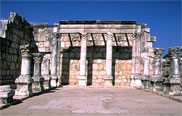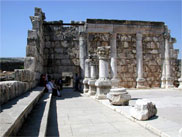Chapter Nine – Sabbath or Sunday in the New Testament?
Next Part But Is Sunday Mentioned in the New Testament?
Back to Saturday or Sunday
Back to By David C. Pack
We have already seen that Christ’s custom was to enter the synagogue “on the sabbath day” (Luke 4:16). We also saw that He is “Lord of the sabbath” (Mark 2:28) and that He never changes (Mal. 3:6; Heb. 13:8).
But what other New Testament evidence is there of Sabbath observance? Are there other passages revealing what day Paul kept—and what day he used to teach those Gentiles God was converting? Let’s examine a series of verses, first referenced in all capital letters.
Contents
Paul and Barnabas Teach on the Sabbath
ACTS 13:14-15, 42-44 contains an account of Paul and Barnabas teaching Jews on the Sabbath: “But when they departed from Perga, they came to Antioch in Pisidia, and went into the synagogue ON THE SABBATH DAY, and sat down. And after the reading of the law and the prophets the rulers of the synagogue sent unto them, saying, You men and brethren, if you have any word of exhortation for the people, say on” (Acts 13:14-15).
The account picks up in Ac 13:42: “And when the Jews were gone out of the synagogue, the Gentiles besought that these words might be preached to them THE NEXT SABBATH” (Acts 13:42). Why would he not tell them to just show up the next day—Sunday—instead of requiring them to wait an entire week, until the next Sabbath, for further instruction? The account says nothing of Paul telling the Gentiles that they no longer had an obligation to keep the Sabbath—that it had been done away. While one might suppose that the Jews still carried this obligation, why did Paul not at least explain to the Gentiles, in a message about the “grace of God,” that the Law had been nailed to the cross? He could have easily explained that the Sabbath was no longer binding in the New Testament era.
Notice verse 43: “Now when the congregation was broken up, many of the Jews and religious proselytes followed Paul and Barnabas: who, speaking to them, persuaded them to continue in the GRACE OF GOD” (Acts 13:43). But more time passed. People wanted to hear more of the “word of God.” Paul required everyone to wait another week—a second time. Another lost opportunity to point the Gentiles to Sunday. Now read: “And THE NEXT SABBATH DAY came almost the whole city together to hear the word of God” (Acts 13:44). “Continuing in the grace of God” meant learning to observe the Sabbath!
Gentiles Also Assemble on Sabbath

FROM THE FIRST CENTURY A.D.: These ruins, located in Capernaum, are built over the synagogue where Christ taught on the Sabbath day (Mark 1:21). These remains reflect what the synagogue may have actually looked like in Christ’s day.
Source: Free Stock Photos
The next passage, ACTS 15:1-2, 14-21, yields important understanding. Examine it closely. Certain Jews had come to Antioch seeking to teach newly converted Gentiles that they must keep the law of Moses and be circumcised to be saved. It states “no small dissension” arose between Paul and Barnabas and these teachers. A conference of ministers was necessary to resolve the question of what was binding on Gentiles. Paul and Barnabas went to Jerusalem to confer with the apostles and elders.
James announced the final decision: “Wherefore my sentence is, that we trouble not them, which from among the Gentiles are turned to God: But that WE WRITE UNTO THEM, that they abstain from pollutions of idols, and from fornication, and from things strangled, and from blood” (Acts 15:19-20).
Let’s examine James’ statement. Some assert that James did not tell them that the Ten Commandments were binding on Gentiles. Of course, he did not say this! The Commandments were not in question. Rather, circumcision and obedience to the law of Moses were the issues in dispute. Think a moment. Would any suggest that, because James did not mention the Ten Commandments, he was tacitly approving cursing, killing, adultery, stealing, lying, etc.? Ridiculous!
How far some will go to get away from the Fourth Commandment!
James did mention four points in Moses’ law that should still be kept. Now notice Ac 15:21: “For Moses of old time has in every city them that preach him, being read in the synagogues EVERY SABBATH DAY” (Acts 15:21). This verse is crucial. It reveals that Gentile converts were attending services and hearing the first five books of the Law “every Sabbath day.” The New Testament records this important clue for those seeking to know which day God’s people were keeping after Christ’s Church began—“every” week.
Why did the apostle’s letter not tell the Gentiles to stop meeting “every Sabbath”? Think of it. This is a giant omission—an enormous missed opportunity to correct what many believe is the greatest burden of all—Sabbath-keeping! It is evident that Gentile converts were routinely instructed to begin meeting on the Sabbath day. This is the message of Ac 15:21!
Another Account
Next we examine ACTS 16:12-15, an account of Paul and Silas observing the Sabbath in Philippi. Careful reading of the account shows that it was a custom for people to meet on a river bank each Sabbath: “And from there to Philippi ... and we were in that city abiding certain days. And ON THE SABBATH we went out of the city by a river side, where prayer was wont to be made; and we sat down, and spoke unto the women which resorted there. And a certain woman named Lydia, a seller of purple, of the city of Thyatira, which worshipped God, heard us: whose heart the Lord opened, that she attended unto the things which were spoken of Paul. And ... she was baptized” (Acts 16:12-15).
Obviously, Paul and those with him kept the Sabbath each week. This required them to find where Sabbath assembly regularly took place locally.
Paul Kept the Sabbath
The next account, ACTS 18:1-11, is remarkable. It reveals that Paul worked during the week and kept the Sabbath—“every” Sabbath: “After these things Paul departed from Athens, and came to Corinth; and found a certain Jew named Aquila ... with his wife Priscilla ... and came unto them. And because he was of the same craft, he abode with them, and wrought: for by their occupation they were tentmakers. And he reasoned in the synagogue EVERY SABBATH, and persuaded the Jews and the Greeks [Gentiles].... and he continued there a year and six months, teaching the word of God among them” (Acts 18:1-4, 11). Eighteen months is equivalent to 78 weekly Sabbaths on which Paul taught God’s Word!
Ac 18:6 shows that the Jews became angry and, blaspheming, departed from Paul. This left him teaching Gentiles only—and yet he continued teaching them on the Sabbath! The argument that he met on the Sabbath to satisfy the Jews holds no water.
Paul taught both Jews and Gentiles each Sabbath. And he worked the other six days in accord with “Six days shall you labour, and do all your work.” If Paul was also observing Sunday, he would have been routinely violating the other aspect of the Sabbath command, having but five days to work.
Finally, notice that Acts 17:2 states that Paul, when in Thessalonica, “... as his manner was, went in unto them, and THREE SABBATH DAYS reasoned with them out of the Scriptures.” This was also a Gentile city.
The pattern is clear. Paul kept the Sabbath, meeting with and teaching brethren everywhere he went. Now consider what he instructed the Gentile Corinthians: “Be you followers of me, even as I also am of Christ” (1 Cor. 11:1).
Next Part But Is Sunday Mentioned in the New Testament?
Back to Saturday or Sunday
Back to By David C. Pack



